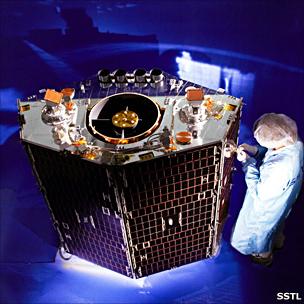UK-built NigeriaSat-2 shows off its vision
- Published

Salt Lake City's airport, with its terminal buildings, runway and approach roads
The most powerful UK-built imaging spacecraft ever sent into orbit has been demonstrating its capability.
Its first pictures since being launched in August show Salt Lake City in the US - its airport and surrounding roads.
The satellite, built for the Nigerian space agency (NASRDA), can acquire images that resolve details on the ground that are just 2.5m across.
Called NigeriaSat-2, the platform will be used by the African nation to map its lands and plan urban development.
It will also assist the Disaster Monitoring Constellation, external.
This UK-managed fleet of spacecraft is used to picture regions of the Earth gripped by natural calamities.
These might be catastrophic floods or a big earthquake. Images sent down from space will often be critical to organising an effective emergency response.

NigeriaSat-2 will be used for land management and urban planning purposes
NigeriaSat-2 was part of a double deal that manufacturer Surrey Satellite Technology Limited (SSTL) did with the NASRDA (National Space Research and Development Agency), external.
The second part was to train Nigerian engineers, to help them construct their own Earth observation satellite. This platform, called NigeriaSat-X, was launched on the same Dnepr rocket that took NigeriaSat-2 into orbit a month and a half ago.
Although there are many satellites in operation today - especially with the US military - that can see much finer details than the UK spacecraft, it is the British technology's capability-for-the-price that has put SSTL in a world-leading position.
The contract for both Nigerian spacecraft, without launch and insurance costs, was valued at £30m.
"I believe NigeriaSat-2 is the most powerful optical Earth observation satellite ever produced in Britain," said Luis Gomes, the satellite's project manager and the head of Earth observation at SSTL.
"In terms of resolution, capacity and its different modes of operation - I don't think Britain has ever done anything better than this," he told BBC News.
SSTL is now building three satellites for its Chinese customers that will be able to resolve details just a metre across.
- Published26 August 2011
- Published17 August 2011
- Published29 June 2011
- Published11 May 2011